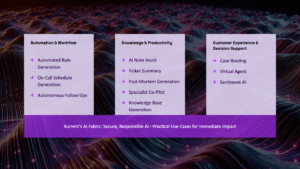
Xurrent today extended the artificial intelligence (AI) capabilities of its IT operations platform to include a fabric for automating and orchestrating agents.
Jim Hirschauer, head of product marketing for Xurrent, said the Sera AI fabric will make it simpler for IT teams to integrate AI agents into their workflows versus trying to manage separate individual AI agents.
Trained using data collected for more than 10 years that span more than 900 use cases, the Xurrent AI agents are capable of, for example, optimizing incident management by identifying which IT job tickets are associated with a critical business function, said Hirschauer
Additionally, Sera AI agents can generate knowledge articles and rules to enable IT teams to automate additional use cases as the IT environment continues to evolve, he added.
It’s not clear at what pace IT teams will embrace AI agents but many of them are already relying on various other types of AI capabilities to, for example, predict outages or summarize events. AI agents take that capability to the next level by leveraging the reasoning capabilities embedded into a large language model (LLM) to automate a task. Each IT team will need to determine how much faith they may want to place in any one AI agent but there is little doubt that there will need to be some type of framework to orchestrate, govern and secure them.
Essentially, Xurrent is making a case for a fabric that will make it simpler for AI agents and the IT teams to supervise them to achieve that level of collaboration.
Of course, Xurrent is not the only provider of an IT service management (ITSM) platform that is embracing agentic AI. The issue becomes determining to what degree IT teams will continue to rely on legacy platforms that might one day have more advanced capabilities versus possibly viewing the rise of AI as an opportunity to evaluate their options.
Regardless of approach, the one thing that is certain is the way the management of IT environments is being transformed. Many of the manual tasks that conspire to make managing IT more tedious than it might otherwise need to be are being increasingly automated using AI. The output being generated by many of those platforms might be a little uneven from time to time, but overall AI does simply many tasks in a way that makes IT teams more productive. That’s likely to be critical as advances in AI also make it easier to build and deploy more applications than ever. In effect, it’s only a matter of time before IT teams that lack access to AI tools will be simply overwhelmed.
The opportunity and the challenge now is not so much focusing solely on what AI can reliably do today, but rather understanding what might be made possible next as additional advances are made. After all, billions of dollars continue to be invested in AI and, unlike IT professionals, the AI agents being built today, even if they make the occasional mistake, never get tired or need to take a day off.


